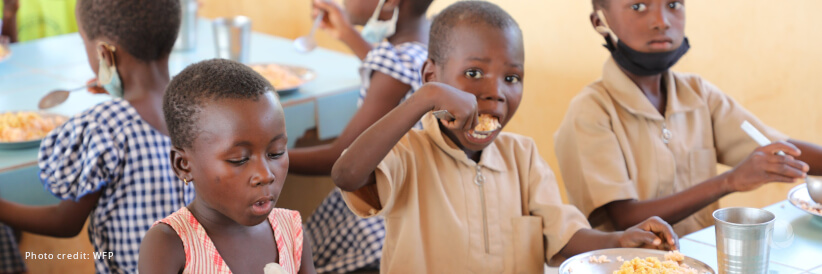A contribution of CAD5.5 million (US$4.1 million) from the Government of Canada will provide more than 23,000 children in South Sudan with access to daily nutritious meals at school, or take-home rations, over the next three years, the United Nations World Food Programme (WFP) announced at a signing ceremony.
There are 2.8 million children out of school across South Sudan and WFP’s school meals are a vital social safety net that helps increase enrolment and attendance at schools, particularly in highly food-insecure areas. The contribution from Canada will be channelled into areas impacted by conflict and climate shocks, both of which cause significant disruptions to education and access to food.
“When conflict or climate shocks strike a community, impacting livelihoods and food availability, schooling is often one of the first things to be deprioritised by families,” said Mary-Ellen McGroarty, Country Director for WFP in South Sudan. “Children, and especially girls, are at risk of being withdrawn from the classroom to help their family at home or to work. Others may be forced to flee their community, leaving everything behind. Providing regular nutritious meals takes some of the pressure off parents and supports childhood development, while also providing continuity in the classroom that will lead to better futures for the students.”
Prolonged school closures through COVID-19 caused enrolment rates to plummet across the country and a slow uptake in enrolment when they reopened in early 2021. A successful Back to School campaign run by WFP and UNICEF saw more children in the classroom, however, this was soon followed by the suspension of the School Feeding Programme in April 2022 for 178,000 children due to significant funding shortfalls, jeopardizing the gains made through the campaign.
The signing ceremony was attended by the Minister for General Education and Instruction, Awut Deng Acuil, Chargé d’Affaires of the Canadian Embassy in Juba, Julius Egbeyemi, and WFP’s Country Director, Mary-Ellen McGroarty. WFP is working closely with the Ministry of General Education and Instruction (MGEI) to implement the School Feeding Programme across South Sudan and ensure the most vulnerable children are included in the initiative.
WFP in South Sudan requires US$531 million to provide lifesaving and life-changing assistance over the next six months. The School Feeding programme has one of the largest funding shortfalls and is less than 30% resourced. Additional funding would allow WFP to expand homegrown school feeding and increase the use of local produce which, in turn, empowers local communities and strengthens local food systems.

